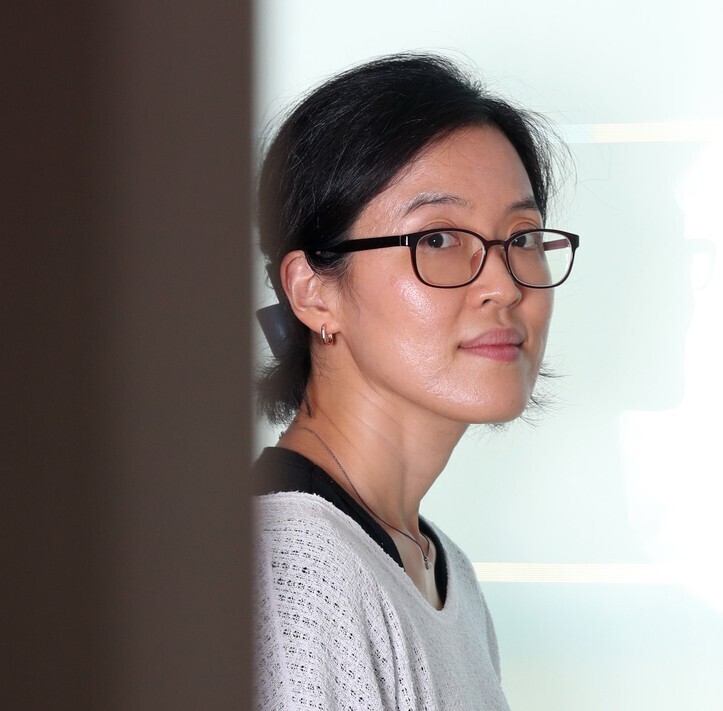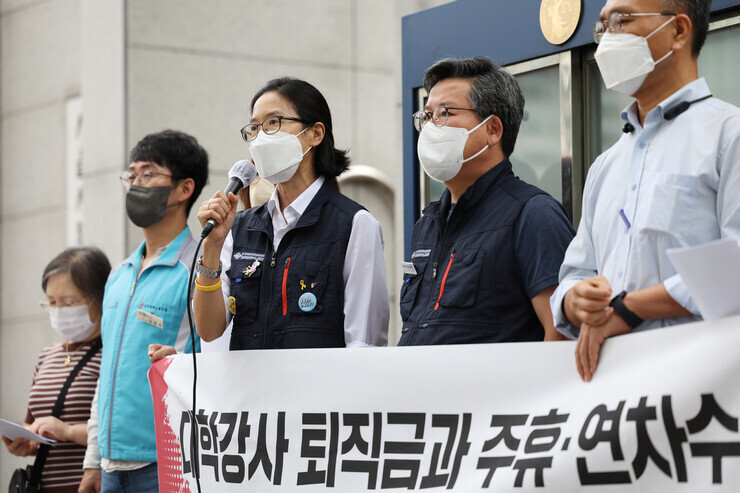hankyoreh
Links to other country sites 다른 나라 사이트 링크
Booker-shortlisted author Bora Chung takes fight for part-time faculty rights to the courthouse

South Korean author Bora Chung has sued Yonsei University, where she used to work as a part-time lecturer, for severance and holiday pay. Chung’s short story collection “Cursed Bunny,” translated into English by Anton Hur, was shortlisted for this year’s International Booker Prize, one of the world’s top three literary prizes. Korean universities are taking fire for failing to respect even the meager protections afforded to lecturers like Chung under Korea’s revised Higher Education Act.
“We call on the court to rule that university lecturers be provided severance pay and holiday pay. The Ministry of Education needs to set aside a budget to enforce the immediate payment of severance to all university lecturers,” said Chung and members of the Korean Irregular Professors Union (KIPU, affiliated with the Korean Confederation of Trade Unions) in a press conference in front of the Seoul Western District Court on Wednesday.
That day, the court held its first hearing in a lawsuit that Chung filed back in April requesting Yonsei University to provide her severance pay, weekend pay, holiday pay and Labor Day pay.
Each semester from 2010 until last year, Chung lectured for 32.5-49.5 hours per course while teaching subjects such as Russian language, Russian literature and Russian culture at Yonsei University. The revised version of the Higher Education Act that was enacted in August 2019 requires universities to pay severance to lecturers who are in class for five or more hours a week. When Yonsei declined to give Chung severance pay, she took the issue to court.
Chung argued that Yonsei should factor in all 11 years she spent working there, but a spokesperson for the university said, “The revised act only requires that severance pay be provided to people hired on or after Aug. 1, 2019. We plan to provide severance pay in accordance with the law.”
“Despite being irregular workers, part-time lecturers teach half of university courses. Refusing to provide these benefits to those who take on more than half of the workload sure sounds like discrimination against irregular workers,” Chung said during the press conference on Wednesday.

Chung is not the only person facing the issues addressed in her lawsuit. Similar lawsuits continue to be brought before the courts, which have been ordering universities to provide part-time lecturers with weekend and holiday pay.
But as far as the lecturers are concerned, little has changed.
“Lecturers have to sue if they want to get severance pay. But considering that they don’t have a lot of official classroom hours, the money they’re awarded in the lawsuit doesn’t even cover their legal expenses,” said Park Jung-ryeol, chair of KIPU.
A more serious issue is that universities seek out legal loopholes that can allow them to avoid providing severance and other kinds of pay.
In previous cases, courts have found that preparing for a lecture takes twice as much time as delivering one. By that logic, a lecturer who spends five hours in the classroom each week would be regarded as having worked 15 hours for the week.
But according to current legislation, employers aren’t required to provide severance pay, weekend pay or holiday pay to those working 15 hours or fewer a week.
“Universities hunt for blind spots in the law. One of their tricks is to give lecturers fewer than five classroom hours a week so they don’t have to provide other benefits,” said Bae Tae-sup, head of outreach for KIPU.
KIPU argues that the calculation of lecturers’ working hours should include not only the time they spend preparing and delivering lecturers and making, administering and grading tests, but also various other kinds of work they perform for the school.
By Seo Hye-mi, staff reporter
Please direct questions or comments to [english@hani.co.kr]

Editorial・opinion
![[Correspondent’s column] The real reason the US is worried about Chinese ‘overcapacity’ [Correspondent’s column] The real reason the US is worried about Chinese ‘overcapacity’](https://flexible.img.hani.co.kr/flexible/normal/500/300/imgdb/original/2024/0510/5217153290112576.jpg) [Correspondent’s column] The real reason the US is worried about Chinese ‘overcapacity’
[Correspondent’s column] The real reason the US is worried about Chinese ‘overcapacity’![[Editorial] Yoon’s gesture at communication only highlights his reluctance to change [Editorial] Yoon’s gesture at communication only highlights his reluctance to change](https://flexible.img.hani.co.kr/flexible/normal/500/300/imgdb/original/2024/0510/7717153284590168.jpg) [Editorial] Yoon’s gesture at communication only highlights his reluctance to change
[Editorial] Yoon’s gesture at communication only highlights his reluctance to change- [Editorial] Perilous stakes of Trump’s rhetoric around US troop pullout from Korea
- [Guest essay] Preventing Korean Peninsula from becoming front line of new cold war
- [Column] The state is back — but is it in business?
- [Column] Life on our Trisolaris
- [Editorial] Penalties for airing allegations against Korea’s first lady endanger free press
- [Editorial] Yoon must halt procurement of SM-3 interceptor missiles
- [Guest essay] Maybe Korea’s rapid population decline is an opportunity, not a crisis
- [Column] Can Yoon steer diplomacy with Russia, China back on track?
Most viewed articles
- 1[Correspondent’s column] The real reason the US is worried about Chinese ‘overcapacity’
- 2Behind bellicose bluster, N. Korea is turning airfields into greenhouse farms
- 3Yoon rejects calls for special counsel probes into Marine’s death, first lady in long-awaited presse
- 4[Book review] Who said Asians can’t make some good trouble?
- 5‘We must say no’: Seoul defense chief on Korean, USFK involvement in hypothetical Taiwan crisis
- 6Presidential office warns of veto in response to opposition passing special counsel probe act
- 7Nuclear South Korea? The hidden implication of hints at US troop withdrawal
- 8With Naver’s inside director at Line gone, buyout negotiations appear to be well underway
- 9Real-life heroes of “A Taxi Driver” pass away without having reunited
- 10How S. Korea’s Yoon flushed 30 years of ties with Russia down the drain